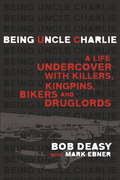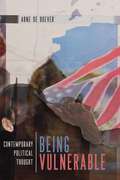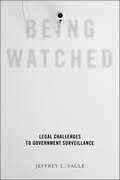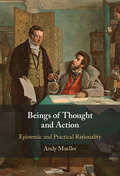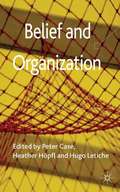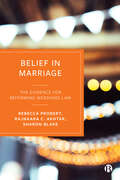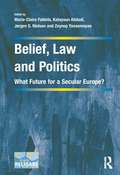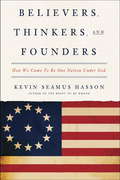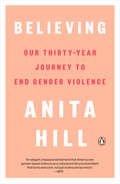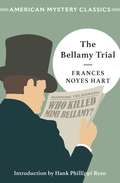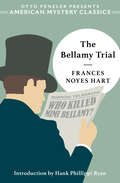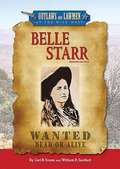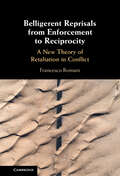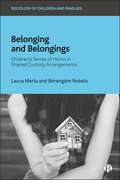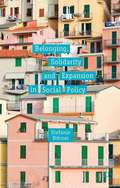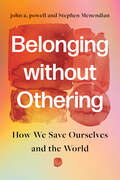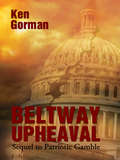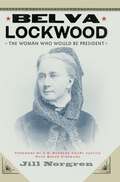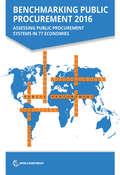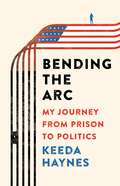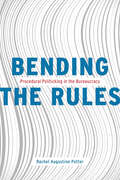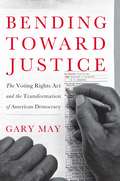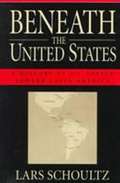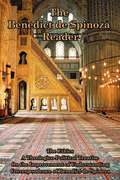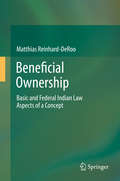- Table View
- List View
Being Uncle Charlie
by Bob DeasyBeing Uncle Charlie is the intense, intimate and graphic story of one Canadian undercover cop who spent two decades infiltrating organized crime. From Russian and Italian mafias to notorious biker gangs, Bob Deasy gained access to and the acceptance of criminals who most cops in any country would never encounter or arrest, let alone befriend.Bob Deasy had an illustrious twenty-three year career with the Ontario Provincial Police. Using little more than his quick wits, natural confidence and a deft mental equilibrium that allowed him to stay three chess moves ahead of his quarry, Deasy was the secret weapon behind some of the signature crime busts in Canadian history. Infiltrating the Outlaws Motorcycle Club and the Russian and Italian mobs, he also single-handedly set up international import-export businesses, faked contract hit jobs and executed one of the largest drug buys in OPP history. He also perfected the now controversial "Mr. Big" technique of posing as a crime kingpin to solicit unwitting confessions from suspects in long-dormant cold murder cases--a tactic he defends as he practised it, and with which he enjoyed a 100% success rate.Being Uncle Charlie is a nail-biting ride--sometimes comic, always entertaining--that reads like a one-man history of modern crime, told through the ground-level, insider's perspective of a cop who was able to blend in with the unsavoury, the desperate and the diabolical.
Being Vulnerable: Contemporary Political Thought (Outspoken)
by Arne De BoeverWe are living in a time of acute vulnerability. From climate change to drone warfare, terrorist attacks to mass shootings, safe spaces to trigger warnings, not to mention the COVID-19 pandemic, homo vulnerabilis is once again coming to terms with the fact that it can be wounded, or even killed.Against such finitude, sovereignty is now reasserting itself as a political power that might save us from our ontological state. The irony is, of course, that such sovereignty – for example through camps, walls, police violence, or drones – is also the underlying, historical cause of many of our most intense contemporary experiences of vulnerabilization. Interrupting the dialectic by which sovereignty manages to be both the cause of our vulnerabilization and the phantasmatic tool of its prevention, in Being Vulnerable Arne De Boever explores how today’s experiences of vulnerabilization can be translated into a collective human power that dismantles the form of sovereignty that is producing this state of affairs. Focused on theories, paradigms, and alternative formations of sovereignty, Being Vulnerable reconsiders the tradition of thinking through a political concept in order to approach it anew.
Being Watched: Legal Challenges to Government Surveillance
by Jeffrey L. VagleA riveting history of the Supreme Court decision that set the legal precedent for citizen challenges to government surveillance The tension between national security and civil rights is nowhere more evident than in the fight over government domestic surveillance. Governments must be able to collect information at some level, but surveillance has become increasingly controversial due to its more egregious uses and abuses, which tips the balance toward increased—and sometimes total—government control.This struggle came to forefront in the early 1970s, after decades of abuses by U.S. law enforcement and intelligence agencies were revealed to the public, prompting both legislation and lawsuits challenging the constitutionality of these programs. As the plaintiffs in these lawsuits discovered, however, bringing legal challenges to secret government surveillance programs in federal courts faces a formidable obstacle in the principle that limits court access only to those who have standing, meaning they can show actual or imminent injury—a significant problem when evidence of the challenged program is secret. In Being Watched, Jeffrey L. Vagle draws on the legacy of the 1972 Supreme Court decision in Laird v. Tatum to tell the fascinating and disturbing story of jurisprudence related to the issue of standing in citizen challenges to government surveillance in the United States. It examines the facts of surveillance cases and the reasoning of the courts who heard them, and considers whether the obstacle of standing to surveillance challenges in U.S. courts can ever be overcome. Vagle journeys through a history of military domestic surveillance, tensions between the three branches of government, the powers of the presidency in times of war, and the power of individual citizens in the ongoing quest for the elusive freedom-organization balance. The history brings to light the remarkable number of similarities among the contexts in which government surveillance thrives, including overzealous military and intelligent agencies and an ideologically fractured Supreme Court. More broadly, Being Watched looks at our democratic system of government and its ability to remain healthy and intact during times of national crisis.A compelling history of a Supreme Court decision and its far-reaching consequences, Being Watched is essential reading for anyone seeking to understand the legal justifications for—and objections to—surveillance.
Beings of Thought and Action: Epistemic and Practical Rationality
by Andy MuellerIn this book, Andy Mueller examines the ways in which epistemic and practical rationality are intertwined. In the first part, he presents an overview of the contemporary debates about epistemic norms for practical reasoning, and defends the thesis that epistemic rationality can make one practically irrational. Mueller proposes a contextualist account of epistemic norms for practical reasoning and introduces novel epistemic norms pertaining to ends and hope. In the second part Mueller considers current approaches to pragmatic encroachment in epistemology, ultimately arguing in favor of a new principle-based argument for pragmatic encroachment. While the book defends tenets of the knowledge-first programme, one of its main conclusions is thoroughly pragmatist: in an important sense, the practical has primacy over the epistemic.
Belief and Organization
by Peter Case Heather Höpfl Hugo LeticheExamines the alternative belief systems which contemporary organizational actors live by and through which they seek to find meaning within the dominant (neo)capitalist social order. This volume marks an attempt to move the study of belief forward within management and organization studies.
Belief in Marriage: The Evidence for Reforming Weddings Law
by Rebecca Probert Rajnaara C. Akhtar Sharon BlakeEPDF and EPUB available Open Access under CC-BY-NC-ND licence. In principle, couples getting married in England and Wales can choose to do so in a way that reflects their beliefs. In practice, the possibility of doing so varies considerably depending on the religious or non-religious beliefs they hold. To demonstrate this divergence, this book draws on the accounts of 170 individuals who had, or led, a wedding ceremony outside the legal framework. The authors examine what these ceremonies can tell us about how couples want to marry, and what aspects of the current law preclude them from doing so. This new evidence shows how the current law does not reflect social understandings of what makes a wedding meaningful. As recommended by the Law Commission, reform is urgently needed.
Belief, Law and Politics: What Future for a Secular Europe? (Cultural Diversity and Law in Association with RELIGARE)
by Marie-Claire Foblets Jørgen S. Nielsen Katayoun Alidadi Zeynep YanasmayanThis edited collection gathers together the principal findings of the three-year RELIGARE project, which dealt with the question of religious and philosophical diversity in European law. Specifically, it covers four spheres of public policy and legislation where the pressure to accommodate religious diversity has been most strongly felt in Europe: employment, family life, use of public space and state support mechanisms. Embracing a forward-looking approach, the final RELIGARE report provides recommendations to governance units at the local, national and European levels regarding issues of religious pluralism and secularism. This volume adds context and critique to those recommendations and more generally opens an intellectual discussion on the topic of religion in the European Union. The book consists of two main parts: the first includes the principal findings of the RELIGARE research project, while the second is a compilation of 28 short contributions from influential scholars, legal practitioners, policy makers and activists who respond to the report and offer their views on the sensitive issue of religious diversity and the law in Europe.
Believers, Thinkers, and Founders: How We Came to Be One Nation Under God
by Kevin Seamus HassonIn Believers, Thinkers and Founders: How We Came to be One Nation Under God, Kevin Seamus Hasson--founder and president emeritus of the Becket Fund for Religious liberty--offers a refreshing resolution to the age-old dispute surrounding the relationship of religion and state: a return to first principles. "The traditional position," writes Hasson, "is that our fundamental human rights--including those secured by the First Amendment--are endowed to us by the Creator and that it would be perilous to permit the government ever to repudiate that point." America has steadfastly taken the position that there is a Supreme Being who is the source of our rights and the author of our equality. It has repeated that point for well over two hundred years throughout all branches and levels of government. Never mind, says the secularist challenge. God is, to put it mildly, religious. Religion has no place in Government. So God has no place in Government. It's just that simple. But for the government to say there is no creator who endows us with rights, Hasson argues, "is to do more than simply tinker with one of the most famous one-liners in history; it is to change the starting point of our whole explanation of who we are as Americans." He proposes a solution straight from the founding: the government acknowledges the existence of God who is the source of our rights philosophically but not religiously. This idea of the "Philosophers' God" is a conception of God based not on faith but on reason. Hasson suggests that by recognizing the distinction between the creator of the Declaration of Independence and the God of our faith traditions, we may be able to move past the culture wars over religion that have plagued the country. In Believers, Thinkers, and Founders, Hasson examines the idea of the "Philosophers' God" while looking at a host of issues--including the Pledge of Allegiance, prayer at public events, and prayer in public schools--as he demonstrates how we can still be one nation under God.
Believing: Our Thirty-Year Journey to End Gender Violence
by Anita HillFrom the woman who gave the landmark testimony against Clarence Thomas as a sexual menace, a new manifesto about the origins and course of gender violence in our society; a combination of memoir, personal accounts, law, and social analysis, and a powerful call to arms from one of our most prominent and poised survivors. <p><p> In 1991, Anita Hill began something that's still unfinished work. The issues of gender violence, touching on sex, race, age, and power, are as urgent today as they were when she first testified. Believing is a story of America's three decades long reckoning with gender violence, one that offers insights into its roots, and paths to creating dialogue and substantive change. It is a call to action that offers guidance based on what this brave, committed fighter has learned from a lifetime of advocacy and her search for solutions to a problem that is still tearing America apart. <p><p> We once thought gender-based violence--from casual harassment to rape and murder--was an individual problem that affected a few; we now know it's cultural and endemic, and happens to our acquaintances, colleagues, friends and family members, and it can be physical, emotional and verbal. Women of color experience sexual harassment at higher rates than White women. Street harassment is ubiquitous and can escalate to violence. Transgender and nonbinary people are particularly vulnerable. Anita Hill draws on her years as a teacher, legal scholar, and advocate, and on the experiences of the thousands of individuals who have told her their stories, to trace the pipeline of behavior that follows individuals from place to place: from home to school to work and back home. In measured, clear, blunt terms, she demonstrates the impact it has on every aspect of our lives, including our physical and mental wellbeing, housing stability, political participation, economy and community safety, and how our descriptive language undermines progress toward solutions. And she is uncompromising in her demands that our laws and our leaders must address the issue concretely and immediately.
The Bellamy Trial
by Frances Noyes HartA scandalous murder trial reaches the heart of high society'An enthralling story' NEW YORK TIMESThe trial of Stephen Bellamy and Susan Ives, accused of murdering Bellamy's wife, lasts eight days. That's eight days of witnesses (some reliable, some not), eight days of cross-examination, and eight days of sensational courtroom theatrics lively enough to rouse the judge into frenzied calls for order. As each witness is brought to the stand, the mystery of the case only increases in all its sordid detail. By the time the closing arguments are made, the verdict shocks the entire courtroom.
The Bellamy Trial (American Mystery Classics)
by Frances Noyes HartA murder trial scandalizes the upper echelons of Long Island society, and the reader is on the jury… The trial of Stephen Bellamy and Susan Ives, accused of murdering Bellamy’s wife Madeleine, lasts eight days. That’s eight days of witnesses (some reliable, some not), eight days of examination and cross-examination, and eight days of sensational courtroom theatrics lively enough to rouse the judge into frenzied calls for order. Ex-fiancés, houseworkers, and assorted family members are brought to the stand—a cross-section of this wealthy Long Island town—and each one only adds to the mystery of the case in all its sordid detail. A trial that seems straightforward at its outset grows increasingly confounding as it proceeds, and surprises abound; by the time the closing arguments are made, however, the reader, like the jury, is provided with all the evidence needed to pass judgement on the two defendants. Still, only the most astute among them will not be shocked by the verdict announced at the end. Inspired by the most sensational murder trial of its day, The Bellamy Trial is a pioneering courtroom mystery, and one of the first of such books to popularize the form. It is included in the famed Haycraft-Queen Cornerstone list of the most definitive novels of the mystery genre.
Belle Starr (Outlaws and Lawmen of the Wild West)
by Carl R. Green William R. SanfordOne of the Wild West's most famous female outlaws, Belle Starr is known as the "Bandit Queen of the West." A sometime horse thief, Belle used her farmland as a hideaway for other outlaws. Authors Green and Sanford separate the fact from the fiction about her extraordinary life in this book from the Outlaws and Lawmen of the Wild West series. REVISED EDITION.
Belligerent Reprisals from Enforcement to Reciprocity: A New Theory of Retaliation in Conflict
by Francesco RomaniThis book challenges the traditional understanding of belligerent reprisals as a mechanism aimed at enforcing the laws of armed conflict. By re-instating reciprocity at the core of belligerent reprisals, it construes them as tools designed to re-calibrate the legal relationship between parties to armed conflict and pursue the belligerents' equality of rights and obligations in both a formal and a substantive sense. It combines an inquiry into the conceptual issues surrounding the notion of belligerent reprisals, with an analysis of State and international practice on their purpose and function. Encompassing international and non-international armed conflicts, it provides a first comprehensive account of the role of reprisals in governing legal interaction during wartime, and offers new grounds to address questions on their applicability, lawfulness, regulation, and desirability. This title is part of the Flip it Open Programme and may also be available Open Access. Check our website Cambridge Core for details.
Belonging and Belongings: Children’s Sense of Home in Shared Custody Arrangements (Sociology of Children and Families)
by Laura Merla Bérengère NobelsAvailable open access digitally under CC-BY-NC-ND licence. Based on in-depth fieldwork with Belgian children aged 10 to 16, this book examines how children in shared physical custody define and negotiate their place within the household of each parent. The authors analyse how family practices within and between each dwelling shape children’s sense home, and the strategies and skills children develop to manage and position themselves in these different environments. Challenging common stereotypes and giving voice to children in shared custody, the book provides valuable insights for practitioners and scholars to better understand and support children and their parents.
Belonging, Solidarity and Expansion in Social Policy
by Stefanie BörnerThis book examines the relationship of belonging and social policy in a historical-comparative perspective reconstructing individual arguments in favour of or opposed to the expansion of solidarities.
Belonging without Othering: How We Save Ourselves and the World
by john a. powell Stephen MenendianThe root of all inequality is the process of othering – and its solution is the practice of belonging We all yearn for connection and community, but we live in a time when calls for further division along the well-wrought lines of religion, race, ethnicity, caste, and sexuality are pervasive. This ubiquitous yet elusive problem feeds on fears – created, inherited – of the "other." While the much-touted diversity, equity, and inclusion initiatives are undeniably failing, and activists narrowly focus on specific and sometimes conflicting communities, Belonging without Othering prescribes a new approach that encourages us to turn toward one another in unprecedented and radical ways. The pressures that separate us have a common root: our tendency to cast people and groups in irreconcilable terms – or the process of "othering." This book gives vital language to this universal problem, unveiling its machinery at work across time and around the world. To subvert it, john a. powell and Stephen Menendian make a powerful and sweeping case for adopting a paradigm of belonging that does not require the creation of an "other." This new paradigm hinges on transitioning from narrow to expansive identities – even if that means challenging seemingly benevolent forms of community-building based on othering. As the threat of authoritarianism grows across the globe, this book makes the case that belonging without othering is the necessary, but not the inevitable, next step in our long journey toward creating truly equitable and thriving societies. The authors argue that we must build institutions, cultivate practices, and orient ourselves toward a shared future, not only to heal ourselves, but perhaps to save our planet as well. Brimming with clear guidance, sparkling insights, and specific examples and practices, Belonging without Othering is a future-oriented exploration that ushers us in a more hopeful direction.
Beltway Upheaval
by Kenneth GormanThe Country has experienced bizarre political events. First, a contingent election in the House of Representatives after no candidate for president garnered 270 electoral votes. Then, the victorious president resigned suddenly on Inauguration Day. Is President Granger guilty of concealing a secret about resigned President Atkinsen in order to succeed him? Speaker of the House Allcott despises Granger who "stole the presidency from me." Granger foresees a disastrous economic decline. He signs Executive Order 14914 to ward off a depression. Allcott condemns the EO and influences the House to Impeach Granger. The Senate decides Granger's fate. Is Allcott guilty of conspiracies? What is the fallout from the Executive Order? Unexpectedly, Granger takes a leave of absence. Who becomes acting president? BELTWAY UPHEAL is a fictional story of presidential actions and conflicts. Can real transformation happen?
Belva Lockwood: The Woman Who Would Be President
by Jill NorgrenA legal historian recounts the influential life of the women&’s rights activist who was the first woman to practice at the bar of the Supreme Court. In Belva Lockwood: The Woman Who Would Be President, prize-winning legal historian Jill Norgren recounts, for the first time, the life story of one of the nineteenth century&’s most surprising and accomplished advocates for women&’s rights. As Norgren shows, Lockwood was fearless in confronting the male establishment, commanding the attention of presidents, members of Congress, influential writers, and everyday Americans. Obscured for too long in the historical shadow of her longtime colleague, Susan B. Anthony, Lockwood steps into the limelight at last in this engaging new biography. Born on a farm in upstate New York in 1830, Lockwood married young and reluctantly became a farmer&’s wife. After her husband&’s premature death, however, she earned a college degree, became a teacher, and moved to Washington, D.C., with plans to become an attorney-an occupation all but closed to women. Not only did she become one of the first female attorneys in the U.S., but in 1879 became the first woman ever allowed to practice at the bar of the Supreme Court. In 1884 Lockwood continued her trailblazing ways as the first woman to run a full campaign for the U.S. Presidency. She ran for President again in 1888. Although her candidacies were unsuccessful (as she knew they would be), Lockwood demonstrated that women could compete with men in the political arena. After these campaigns she worked tirelessly on behalf of the Universal Peace Union, hoping, until her death in 1917, that she, or the organization, would win the Nobel Peace Prize. Belva Lockwood deserves to be far better known. As Norgren notes, it is likely that Lockwood would be widely recognized today as a feminist pioneer if most of her personal papers had not been destroyed after her death. Fortunately for readers, Norgren shares much of her subject&’s tenacity and she has ensured Lockwood&’s rightful place in history with this meticulously researched and beautifully written book. Foreword by U.S. Supreme Court Justice Ruth Bader Ginsburg
Benchmarking Public Procurement 2016
by World Bank GroupPublic procurement accounts for around one-fifth of global gross domestic product (GDP). Given its size the public procurement market can improve public sector performance, promote national competitiveness, drive domestic economic growth, and boost economic development. Launched at the request of the G20 Anti-Corruption Working Group, Benchmarking Public Procurement presents actionable indicators to help countries identify and monitor policies and regulations that impact how private sector companies do business with the government in 77 economies. The Benchmarking Public Procurement 2016 report is organized under two parts: the public procurement life cycle and the complaint and reporting mechanisms indicators. Data was gathered using standardized questionnaires distributed to expert contributors in each economy. The project builds on the Doing Business methodology and aims to promote evidence-based decision making by governments and shed light over areas where few empirical data have been presented so far.
Bending the Arc: My Journey from Prison to Politics
by Keeda J. HaynesA searing exposé of the profound failures in our justice system, told by a woman who has journeyed from wrongfully accused prisoner to acclaimed public defender Keeda Haynes was a Girl Scout and a churchgoer, but after college graduation, she was imprisoned for a crime she didn&’t commit. Her boyfriend had asked her to sign for some packages—packages she did not know were filled with marijuana. As a young Black woman falsely accused, prosecuted, and ultimately imprisoned, Haynes suffered the abuses of our racist and sexist justice system. But rather than give in to despair, she decided to fight for change. After her release, she attended law school at night, became a public defender, and ultimately staged a highly publicized campaign for Congress. At every turn of her unlikely story, she gives unique insights into the inequities built into our institutions. In the end, despite the injustice she endured, she emerges convinced that ours can become a true second-chance culture.
Bending the Rules: Procedural Politicking in the Bureaucracy
by Rachel Augustine PotterWho determines the fuel standards for our cars? What about whether Plan B, the morning-after pill, is sold at the local pharmacy? Many people assume such important and controversial policy decisions originate in the halls of Congress. But the choreographed actions of Congress and the president account for only a small portion of the laws created in the United States. By some estimates, more than ninety percent of law is created by administrative rules issued by federal agencies like the Environmental Protection Agency and the Department of Health and Human Services, where unelected bureaucrats with particular policy goals and preferences respond to the incentives created by a complex, procedure-bound rulemaking process. With Bending the Rules, Rachel Augustine Potter shows that rulemaking is not the rote administrative activity it is commonly imagined to be but rather an intensely political activity in its own right. Because rulemaking occurs in a separation of powers system, bureaucrats are not free to implement their preferred policies unimpeded: the president, Congress, and the courts can all get involved in the process, often at the bidding of affected interest groups. However, rather than capitulating to demands, bureaucrats routinely employ “procedural politicking,” using their deep knowledge of the process to strategically insulate their proposals from political scrutiny and interference. Tracing the rulemaking process from when an agency first begins working on a rule to when it completes that regulatory action, Potter shows how bureaucrats use procedures to resist interference from Congress, the President, and the courts at each stage of the process. This exercise reveals that unelected bureaucrats wield considerable influence over the direction of public policy in the United States.
Bending Toward Justice: The Voting Rights Act and the Transformation of American Democracy
by Gary MayWhen the Fifteenth Amendment of 1870 granted African Americans the right to vote, it seemed as if a new era of political equality was at hand. Before long, however, white segregationists across the South counterattacked, driving their black countrymen from the polls through a combination of sheer terror and insidious devices such as complex literacy tests and expensive poll taxes. Most African Americans would remain voiceless for nearly a century more, citizens in name only until the passage of the 1965 Voting Rights Act secured their access to the ballot. In "Bending Toward Justice," celebrated historian Gary May describes how black voters overcame centuries of bigotry to secure and preserve one of their most important rights as American citizens. The struggle that culminated in the passage of the Voting Rights Act was long and torturous, and only succeeded because of the courageous work of local freedom fighters and national civil rights leadersOCoas well as, ironically, the opposition of Southern segregationists and law enforcement officials, who won public sympathy for the voting rights movement by brutally attacking peaceful demonstrators. But while the Voting Rights Act represented an unqualified victory over such forces of hate, May explains that its achievements remain in jeopardy. Many argue that the 2008 election of President Barack Obama rendered the act obsolete, yet recent years have seen renewed efforts to curb voting rights and deny minorities the actOCOs hard-won protections. Legal challenges to key sections of the act may soon lead the Supreme Court to declare those protections unconstitutional. A vivid, fast-paced history of this landmark piece of civil rights legislation, "Bending Toward Justice" offers a dramatic, timely account of the struggle that finally won African Americans the ballotOCoalthough, as May shows, the fight for voting rights is by no means over. "
Beneath the United States: A History of U. S. Policy Toward Latin America
by Lars Schoultz<p>In this sweeping history of United States policy toward Latin America, Lars Schoultz shows that the United States has always perceived Latin America as a fundamentally inferior neighbor, unable to manage its affairs and stubbornly underdeveloped. <p>This perception of inferiority was apparent from the beginning. John Quincy Adams, who first established diplomatic relations with Latin America, believed that Hispanics were "lazy, dirty, nasty...a parcel of hogs." In the early nineteenth century, ex-President John Adams declared that any effort to implant democracy in Latin America was "as absurd as similar plans would be to establish democracies among the birds, beasts, and fishes." <p>Drawing on extraordinarily rich archival sources, Schoultz, one of the country's foremost Latin America scholars, shows how these core beliefs have not changed for two centuries. We have combined self-interest with a "civilizing mission"--a self-abnegating effort by a superior people to help a substandard civilization overcome its defects. William Howard Taft felt the way to accomplish this task was "to knock their heads together until they should maintain peace," while in 1959 CIA Director Allen Dulles warned that "the new Cuban officials had to be treated more or less like children." Schoultz shows that the policies pursued reflected these deeply held convictions. <p>While political correctness censors the expression of such sentiments today, the actions of the United States continue to assume the political and cultural inferiority of Latin America. Schoultz demonstrates that not until the United States perceives its southern neighbors as equals can it anticipate a constructive hemispheric alliance.</p>
The Benedict de Spinoza Reader
by Benedict De SpinozaBenedict de Spinoza's writings laid the groundwork for the 18th century Enlightenment and for modern Biblical criticism. By virtue of his magnum opus, the Ethics, Spinoza is considered one of Western philosophy's definitive ethicists. Men would never be superstitious, if they could govern all their circumstances by set rules, or if they were always favoured by fortune: but being frequently driven into straits where rules are useless, and being often kept fluctuating pitiably between hope and fear by the uncertainty of fortune's greedily coveted favours, they are consequently, for the most part, very prone to credulity. The human mind is readily swayed this way or that in times of doubt, especially when hope and fear are struggling for the mastery, though usually it is boastful, over-confident, and vain. After experience had taught me that all the usual surroundings of social life are vain and futile; seeing that none of the objects of my fears contained in themselves anything either good or bad, except in so far as the mind is affected by them, I finally resolved to inquire whether there might be some real good having power to communicate itself, which would affect the mind singly, to the exclusion of all else: whether, in fact, there might be anything of which the discovery and attainment would enable me to enjoy continuous, supreme, and unending happiness. Spinoza was one of the great rationalists of 17th century philosophy. He helped lay the groundwork for the 18th century Enlightenment and modern biblical criticism. His correspondence helps shed light on his ethical opinions and positions. Required reading for those who wish a deeper understanding of the writings of Benedict de Spinoza.
Beneficial Ownership: Basic and Federal Indian Law Aspects of a Concept
by Matthias Reinhard-DerooThe hunt for beneficial owners is on. Like an elephant, the beneficial owner hides in the jungle of complex legal structures, waiting to be discovered by eager prosecutors. But what lies behind this metaphor? What is a Beneficial Owner? Is beneficial ownership a right? What does this right encompass? What is the value of this right compared to other rights? And if beneficial ownership is not a right, is it still a legally relevant relation? How do courts, namely the U. S. Supreme Court deal with the concept? When do Anglo-American judges and European scholars resort to the concept? This book approaches these questions from two perspectives: legal fundamentals and the field of U. S. federal Indian law. Both legal theories and case law are scrutinized with the aim to find a better understanding of the basic conception and characteristics of beneficial ownership Federal Indian law has been chosen for the study of the concrete implications of the beneficial ownership concept in what Roscoe Pound referred to as "the law in action. " To some, this choice of legal field might seem somewhat unusual. What answers could federal Indian law possibly offer with regard to pressing questions from the financial industry? As always, there is a short and a long answer. The short answer is that the analysis of an equally sophisticated field of law can open new perspectives on a given field of law. For example, not only potential criminals and tax evaders but also members of an older civilization are beneficial owners. The long answer can be found in this very book.
